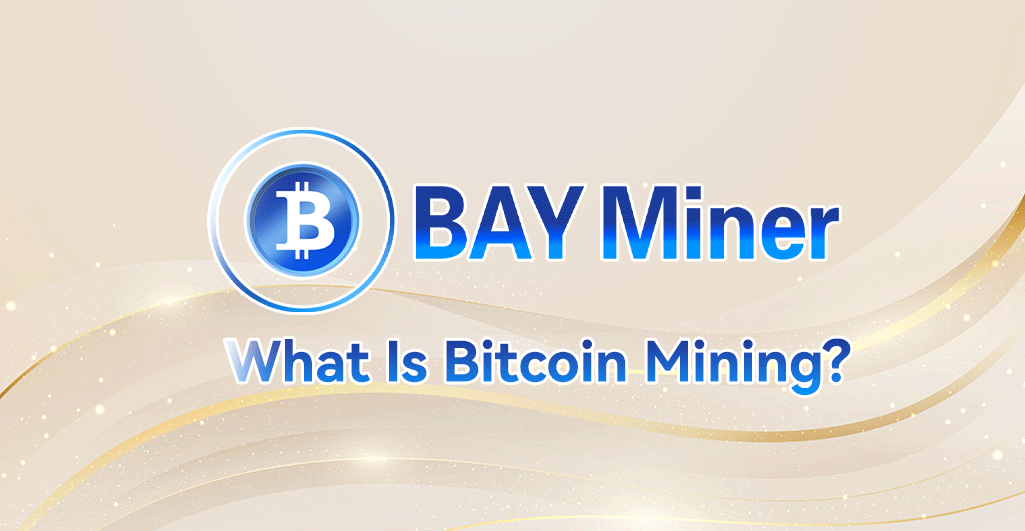What is Ethereum (ETH)? A Beginner’s Guide to the Smart Contract Blockchain
Created by Vitalik Buterin, Ethereum is a blockchain that enables smart contracts and dapps to operate on its network.
In brief
Ethereum transformed the blockchain industry by enabling smart contracts, DAOs, NFTs, and decentralized apps.
From its 2015 launch to The Merge in 2022, Ethereum has driven innovation and faced growing pains.
Ethereum powers DeFi and NFTs, but still battles high fees, scalability limits, and fierce competition.
Click here for the complete article – Courtesy of Decrypt.co

A Beginner-Friendly Guide
Bitcoin mining is the process by which new bitcoins are created and transactions are verified on the Bitcoin blockchain. It’s a foundational element of the Bitcoin network that ensures decentralization, security, and trust — all without the need for a central authority.
How Bitcoin Mining Works
Bitcoin operates on a consensus mechanism known as Proof of Work (PoW). This means that miners compete to solve complex mathematical problems using specialized hardware. The first miner to solve the puzzle adds a new block to the blockchain and receives a reward in the form of freshly minted bitcoins and transaction fees.
- A new block is added approximately every 10 minutes
- The current reward is 6.25 BTC per block (as of the last halving)
- Mining secures the network by making it computationally expensive to attack
Why Mining Matters
Mining plays two vital roles in the Bitcoin network:
- Issuance of new bitcoins — This is how new BTC enters circulation.
- Verification of transactions — Miners ensure transactions are legitimate and prevent double-spending.
In the early days, anyone with a personal computer could mine Bitcoin. Today, however, profitable mining requires specialized equipment (like ASICs), low electricity costs, and technical expertise.
The Rise of Cloud Mining
Due to the rising costs and complexity of home mining, many individuals are turning to cloud mining — a model that lets users rent computing power from professional data centers.
This is where BAY Miner stands out.
Why Choose BAY Miner?
BAY Miner is a global cloud mining platform designed to make Bitcoin mining accessible, transparent, and sustainable for everyone — from beginners to experienced crypto investors.
Advantages of BAY Miner:
1. Clean Energy-Powered Infrastructure
BAY Miner is powered by renewable energy sources, including solar, wind, and hydro, helping reduce the environmental impact of mining operations.
2. Flexible Contract Options
Choose from a variety of mining contracts tailored to different investment sizes and return expectations — perfect for both conservative and growth-minded investors.
3. Daily Passive Income
Earnings are distributed automatically on a daily basis, giving users consistent, hands-free returns.
4. Zero Technical Hassle
No need to buy, set up, or maintain hardware. BAY Miner handles all technical aspects, making it ideal for non-technical users.
5. Transparent Payouts & Real-Time Monitoring
All mining rewards are backed by real hash power. Users can monitor performance with a live dashboard and enjoy full payout transparency.
Start Mining Smarter
With BAY Miner, you can participate in the Bitcoin ecosystem with ease, security, and sustainability.
Join BAY Miner today and start earning daily Bitcoin rewards — powered by clean energy and built for the future.
Myriad Protocol Explained
🧩 What Is the Myriad Protocol?
The Myriad Protocol is a decentralized identity and messaging protocol built for the blockchain world. It’s designed to give you control over your digital identity and let you communicate securely and anonymously across different platforms—without relying on big tech companies.
🧠 Think of It Like This:
Imagine you have one digital passport that you can use:
- To log in to websites and apps (without giving away your email or phone number)
- To send and receive messages anonymously
- To prove who you are (or that you’re trusted) without revealing personal info
That’s what Myriad wants to enable—a universal identity and messaging layer for the decentralized web.
🔑 Key Features of Myriad Protocol
- Decentralized Identity (DID):
- Your identity lives on the blockchain—you control it, not Google, Meta, or Apple.
- You can prove you’re the same person across apps, wallets, and services without revealing your real name.
- Private, Secure Messaging:
- End-to-end encrypted.
- No one (not even Myriad) can read your messages.
- Interoperability:
- Works across chains and apps (like Ethereum, Bitcoin, Solana, etc.).
- You can link multiple wallets or accounts to one identity.
- Zero-Knowledge Proofs (ZKPs):
- You can prove things about yourself without revealing data.
Example: “I’m over 18” without saying your birthdate.
- You can prove things about yourself without revealing data.
- Anti-Sybil Protection:
- Helps apps know you’re a real, unique human without invading your privacy.
- Great for voting, airdrops, or preventing bots.
🤖 Why It Matters
Right now, most crypto users have multiple wallet addresses, scattered across apps. Myriad helps bring everything together under one trusted, privacy-first identity, so:
- You can build reputation
- Receive messages tied to your wallet
- Reduce scams and spam
- Keep control over your data
💡 Who’s It For?
- Developers: who want to add secure login, identity, or messaging to dApps.
- Users: who want privacy-respecting tools without Big Tech tracking.
- Projects: that need reputation, anti-bot protections, or cross-platform identity.

